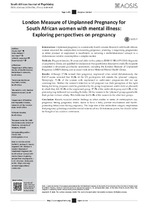London Measure of Unplanned Pregnancy for South African women with mental illness: Exploring perspectives on pregnancy
Date
2018Author
du Toit, Elsa
Jordaan, Esme
Koen, Liezl
Leppanen, Jukka M.
Niehaus, Dana
Metadata
Show full item recordAbstract
INTRODUCTION: Unplanned pregnancy is a community health concern. Research with South African
women revealed the complexities surrounding pregnancy planning. Categorising pregnancies
as either planned or unplanned is insufficient, as reducing a multidimensional concept to a
dichotomous variable oversimplifies a complex matter.
METHODS: Pregnant females, 18 years and older with a primary DSM-IV-TR (APA 2000) diagnosis
of psychiatric illness, are qualified for inclusion in this quantitative descriptive study. Participants
completed a structured psychiatric assessment, including the London Measure of Unplanned
Pregnancy (LMUP) during care as usual visits at two Maternal Mental Health Clinics.
RESULTS: Although 37.1% termed their pregnancy unplanned when asked dichotomously, the
LMUP scores revealed that 50.6% of the 170 participants fell outside the ‘planned’ category.
Worryingly, 73.3% of the women with unplanned or ambivalent pregnancies did not use
contraception. Neither the women’s intention to fall pregnant nor their perception of the right
timing for being pregnant could be predicted by the group (unplanned, ambivalent or planned)
in which they fell; 82.6% of the unplanned group, 57.1% of the ambivalent group and 6.0% of the
planned group indicated not wanting the baby. All the women in the ‘planned’ group agreed with
their partner to have a baby. This holds true for 24.4% of the women in the other two groups.
CONCLUSION: Results revealed similar findings as other studies in terms of contraception use,
pregnancy timing, pregnancy intent, desire to have a baby, partner involvement and healthpromoting
behaviours during pregnancy. The large size of the ambivalent category emphasises
that pregnancy planning cannot be viewed in terms of two dichotomous points, but should rather
be thought of as a scale or continuum.

